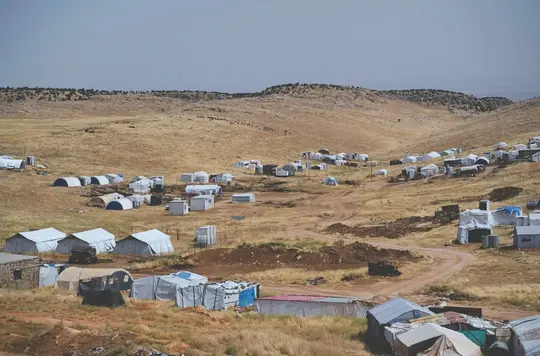20 November 2025
1 Peter 4: Living for God
Major David Cavanagh
Major David Cavanagh considers challenges and consequences.
Key texts
It has been said that you don’t have something to live for until you have something you are prepared to die for. It’s a challenging statement. I’m not sure, however, how helpful it is for Christians living in a society where faith is generally tolerated, if sometimes regarded with patronising disdain.
Pause and reflect
- Do you find it difficult to be a Christian in the UK today?
The situation is perhaps not so different in our study passage. The Christians of Asia Minor may not fear for their lives, but they are dealing with ridicule, social exclusion and stigma because of their faith in Jesus.
The apostle Peter tries to encourage them by drawing a parallel between their ‘suffering’ and that of Jesus: ‘Since Christ suffered in his body, arm yourselves also with the same attitude, because whoever suffers in the body has finished with sin’ (v1).
Like Jesus, the Christians of Asia Minor are done with sin and therefore refuse to join in the mad dash after pleasure, fun and thrills that their neighbours pursue. These Christians ‘do not live … for evil human desires, but rather for the will of God’ (v2). Their restraint challenges the prevailing philosophy of ‘eat, drink and be merry, for tomorrow we die’.
Pause and reflect
- What do you learn from Jesus’ life and experiences that can help you be a faithful Christian?
It may make sense to eat, drink and be merry if this life is all there is. However, Christians know otherwise and march to a different drum. ‘They are surprised that you do not join them in their reckless, wild living, and they heap abuse on you’ (v4).
We know that God offers life beyond death to everyone who trusts in him (see John 3:16 and 17). John 3:19–21 also says: ‘People loved darkness instead of light because their deeds were evil… But whoever lives by the truth comes into the light, so that … what they have done has been done in the sight of God.’
We know that one day everyone will have to give an account of their life to God. Peter warns his readers: ‘They will have to give account to him who is ready to judge the living and the dead’ (v5). Understanding this changes the way we live our life, as New Testament scholar Peter H Davids remarks: ‘If the end is right around the corner, we should live accordingly.’
‘For this is the reason the gospel was preached even to those who are now dead, so that they might be judged according to human standards in regard to the body, but live according to God in regard to the spirit’ (v6).
The line of thought in verses 5 and 6 is complicated and is much discussed. However, as J Ramsey Michaels and other scholars point out, verse 6 is essentially ‘a footnote to verse 5’, picking up the mention of ‘the living and the dead’. It is perhaps best to see this as affirming that God has, in ways we do not fully understand, offered life to everyone through the preaching of the gospel, and this is the basis for his just judgement.
Pause and reflect
- For many Christians today, the second coming and the day of judgement don’t feature much in their thinking. Can these ideas be revitalised? Or has too much time passed?
If verses 1 to 6 are concerned with how Christians should live in a world that is hostile to their faith, verses 7 to 11 deal with the inner life and character of the Christian community.
The picture of the Christian community that emerges is in some ways that of a citadel and refuge from the hostility of the surrounding world. That was certainly appropriate to the situation the first-century Christians of Asia Minor were facing.
We may still need church to be a safe space today. The gospel’s claim to absolute truth is not always welcome in a world of pluralism. It can be uncomfortable to be known as a Christian.
Pause and reflect
- Is there still a role for the Church as a refuge from a world hostile to Christian ideas?
If we look more closely, we see that Christians are meant to be a community marked above all else by love: ‘Love each other deeply, because love covers over a multitude of sins’ (v8). This is probably in the sense of a patient acceptance of one another’s failings.
That same love is also shown by offering ‘hospitality to one another without grumbling’ (v9), which, in this context, does not mean hosting dinner parties. Rather more likely, it means supporting the itinerant teachers who spread the gospel. Being faithful stewards of God’s grace, in readiness to serve others, is key to God receiving the praise (see vv10 and 11).
One scholar suggests the key principle here is ‘mutuality’. Everyone needs love and support, and everyone has something to give to help their neighbour. That leads me to wonder if the Church today may also have a role as an open space where all find a welcome, and are invited to offer whatever they have to contribute to the common good.
Pause and reflect
- Can our fellowships be spaces open to all in our society who need love and support?
- How is ‘mutuality’ expressed in your fellowship?
Bible study by

Major David Cavanagh
Ecumenical and Parliamentary Officer, Scotland
Discover more

Lieutenant Elliot Kervin uncovers how hope and holiness are revealed in Jesus.

Major Graham Mizon reminds us that Jesus is the one who invites us, unites us and holds us together.

Major Ian Haylett shares how God reveals blessings amid difficulties.

